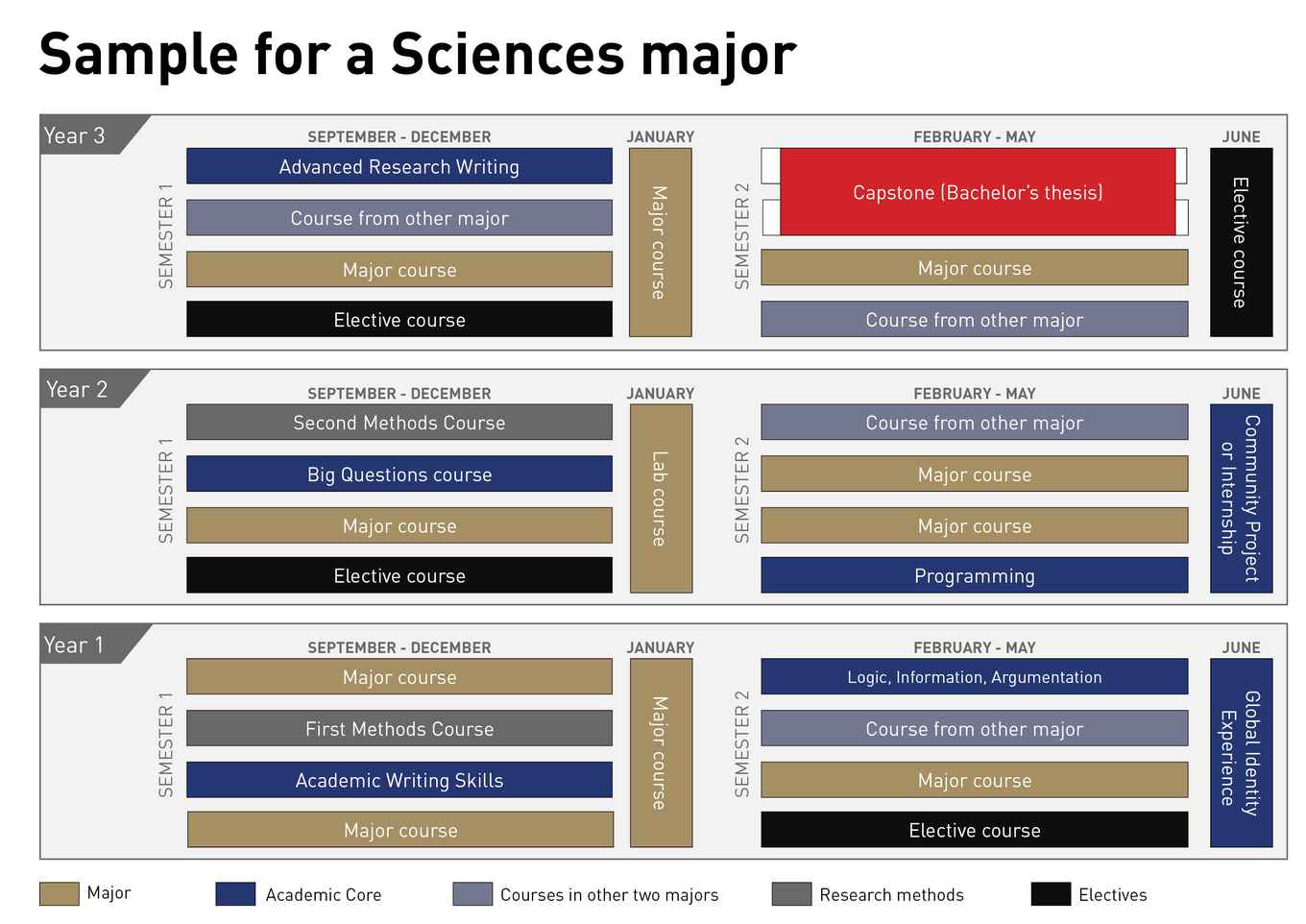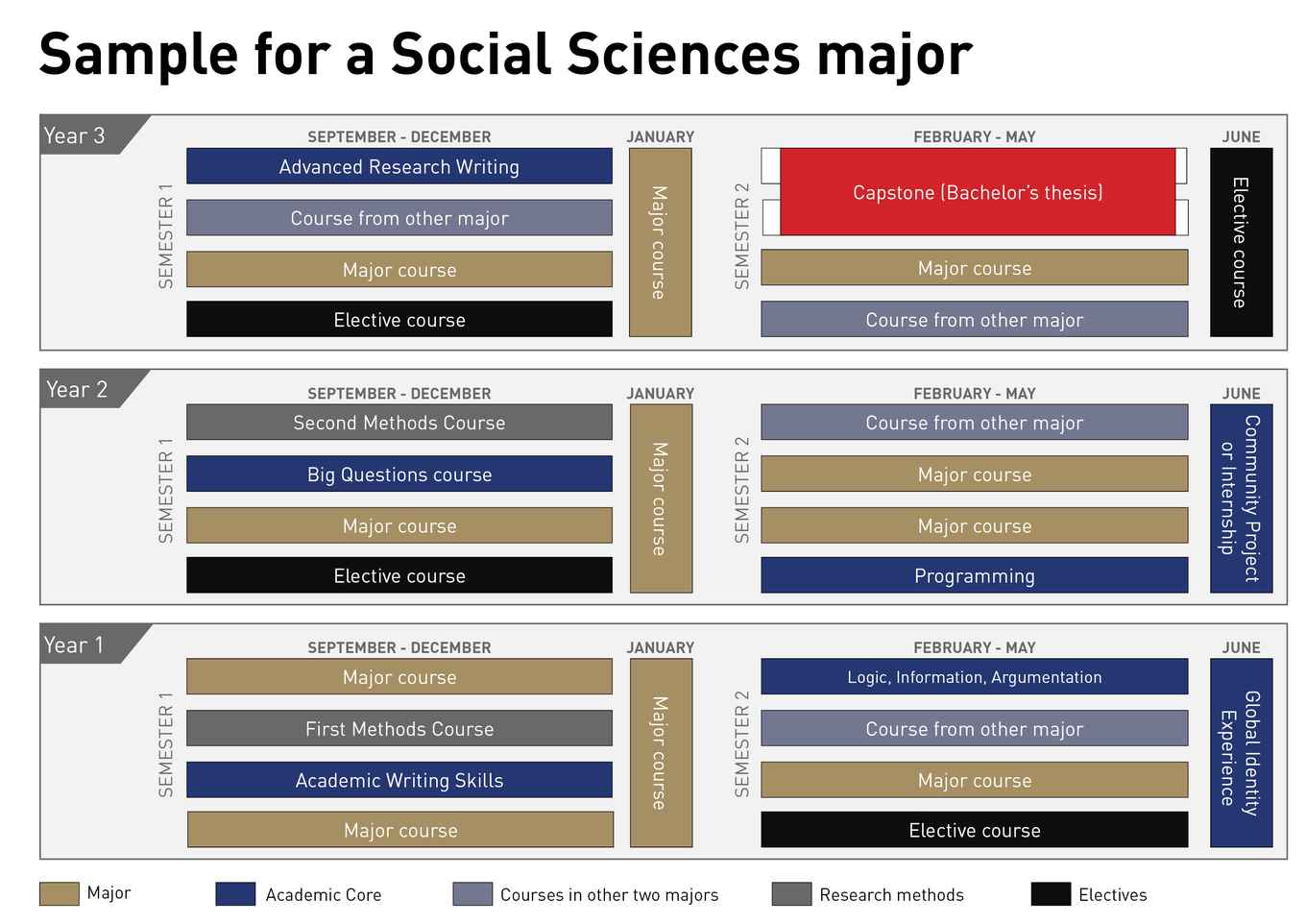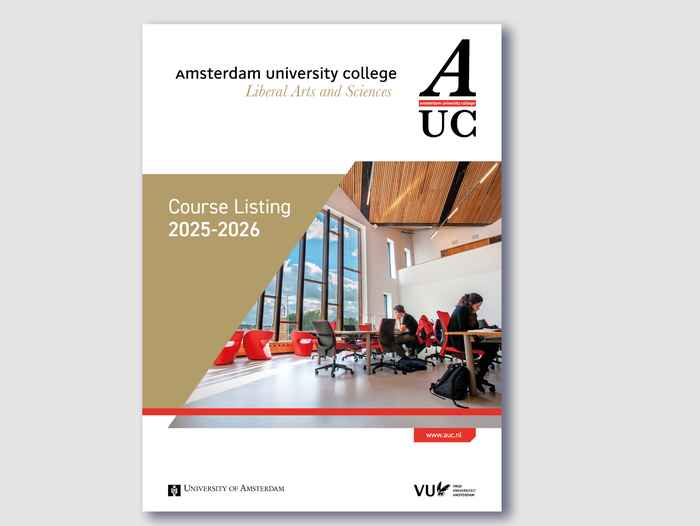Programme structure
How is the curriculum structured?
Curriculum structure
AUC’s interdisciplinary programme takes three years to complete, spread across six semesters for a total of 180 European Credits (EC). Each semester is 20 weeks and is divided into a 16-week block followed by a shorter 4-week block. Students take five courses per semester, with four during the longer block and one in the shorter block. Most courses are worth 6 EC. Altogether, this amounts to a total workload of around 42 hours per week (16 hours of class plus 26 hours of self-study).
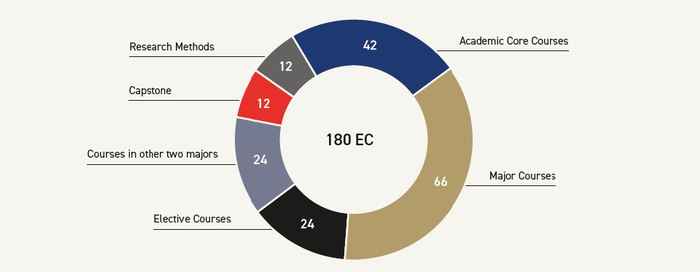
-
Curriculum for a Sciences Major
A Sciences major leads to a Bachelor of Science in the Liberal Arts and Sciences, and includes the following components:
Curriculum Requirements for the Sciences Major
Credits to be completed
Explanation
Academic Core
42 EC
Seven foundational academic courses, including one Big Question’s course, one Programming course and a Community Project or Internship.
Major Courses
66 EC
Eleven courses in the Sciences, at least four of which must be at the 300 level, and at least one must be a Sciences Lab course.
Research Methods in Sciences
12 EC
Two research methods courses before the end of your second year.
Courses in the other two majors
24 EC
Four courses outside the Sciences: two in Humanities and two in Social Sciences.
Electives
24 EC
Four elective courses in any topic of interest.
Capstone
12 EC
A Bachelor’s Thesis completed in the final semester of the third year.
Total
180 EC
-
Curriculum for a Social Sciences Major
A Social Sciences major leads to a Bachelor of Arts in the Liberal Arts and Sciences, and includes the following components:
Curriculum Requirements for the Social Sciences Major
Credits to be completed
Explanation
Academic Core
42 EC
Seven foundational academic courses, including one Big Question’s course, one Programming course and a Community Project or Internship.
Major Courses
66 EC
Eleven courses in the Social Sciences, at least four of which must be at the 300 level.
Research Methods in Social Sciences
12 EC
Two research methods courses: one at the 100 level and one at the 200 level.
Courses in the other two majors
24 EC
Four courses outside the Social Sciences: two in Humanities and two in Sciences.
Electives
24 EC
Four elective courses in any topic of interest.
Capstone
12 EC
A Bachelor’s thesis completed in the final semester of the third year.
Total
180 EC
-
Curriculum for a Humanities Major
A Humanities major leads to a Bachelor of Arts in the Liberal Arts and Sciences, and includes the following components:
Curriculum Requirements for the Humanities Major
Credits to be completed
Explanation
Academic Core
42 EC
Seven foundational academic courses, including one Big Question’s course, one Programming course and a Community Project or Internship.
Major Courses
66 EC
Eleven courses in the Humanities, at least four of which must be at the 300 level.
Research Methods in Humanities
12 EC
Two research methods courses: one at the 100 level and one at the 200 level.
Courses in other two majors
24 EC
Four courses outside the Humanities: two in Social Sciences and two in Sciences.
Electives
24 EC
Four elective courses in any topic of interest.
Capstone
12 EC
A Bachelor’s thesis completed in the final semester of the third year.
Total
180 EC
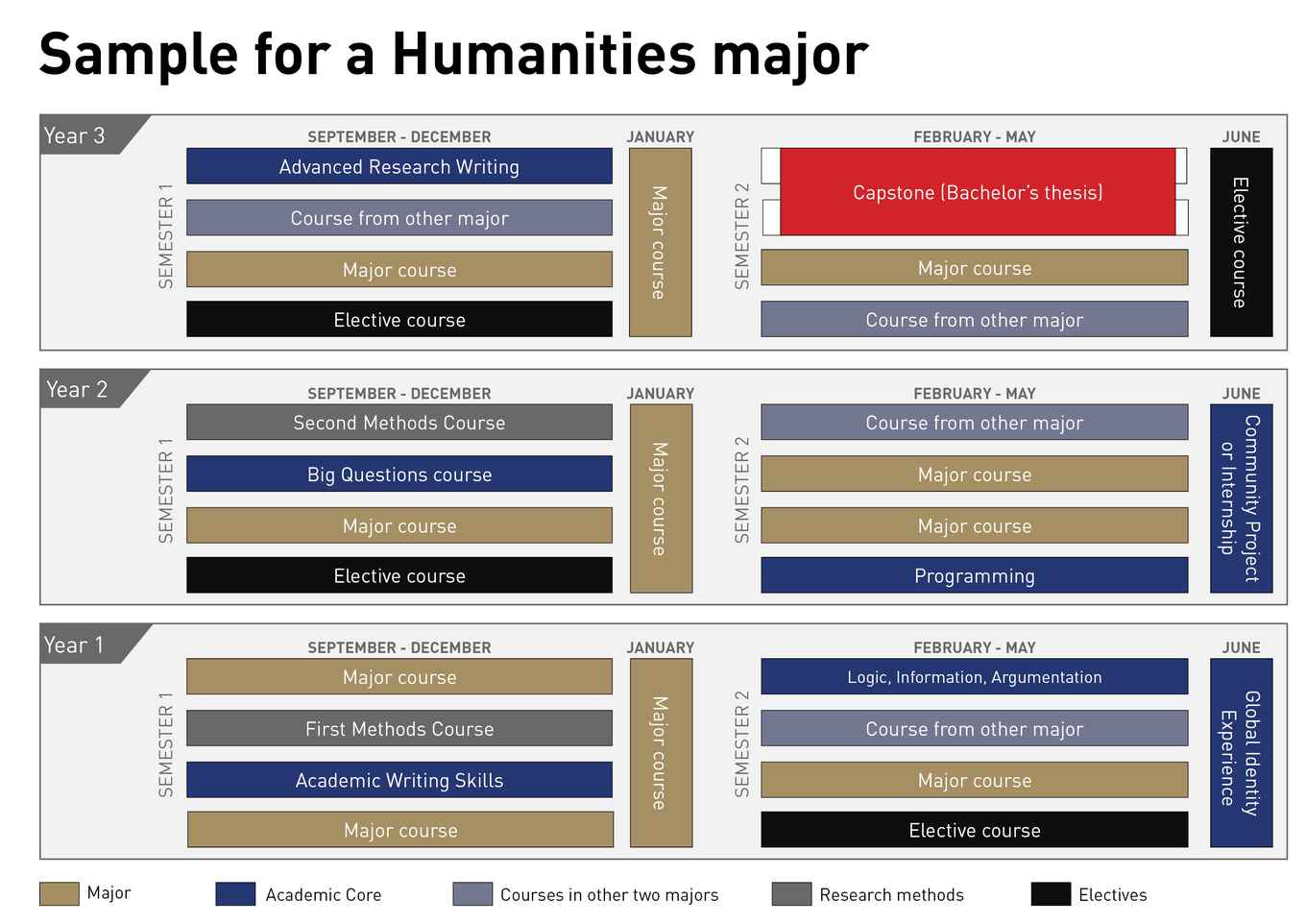
*This is a sample plan. Students can adjust when they take each requirement throughout the three years.
If you would like to explore the courses offered at AUC, you can consult our course listing. This gives an overview of all the classes offered so you can start shaping an individual study plan that matches your interests.
More information about the components of the AUC curriculum
Academic Core courses
Academic Core courses (42 EC, equivalent to seven courses) are classes that all AUC students must take. The Academic Core provides a foundation for the rest of the programme and includes Big Questions courses, logic, academic writing courses, programming courses, The Global Identity Experience, and community projects and internships.
-
Academic Core courses required for all students
- Academic Writing Skills
- Logic, Information and Argumentation
- The Global Identity Experience
- Advanced Research Writing
- One Big Questions course
- One programming course
- Community Project or Internship
Major courses
At AUC, students choose one of the three majors: Sciences, Social Sciences or Humanities. Based on this selection, students take courses to fulfil their major requirements. The level (100, 200 or 300) corresponds to how advanced the course is considered to be, with 100-level indicating an entry-level course and 300-level indicating specialised and more advanced courses.
Courses outside of your major
Students at AUC must take at least two courses in each major that is not their own (24 EC, equivalent to 4 courses). For example, if a student majors in Humanities, they will need to follow at least two courses in the Sciences and two courses in the Social Sciences to fulfil their degree requirements. Students are free to select any courses they are interested in and for which they meet the prerequisite(s).
Elective courses
In addition to Academic Core courses and major courses, all students are required to take at least two courses in each major other than their own, as well as electives of their choice. Elective courses can be selected from any of the three majors. It is also possible to study off-campus in the Netherlands or abroad, and to take courses at other institutions as electives. Electives allow students to explore fields or disciplines that may not be related to their major or delve further into a specific area or specialisation within their major.
Capstone
In the third year of the programme, all students complete a Bachelor's thesis known as the Capstone project, worth 12 EC. This project involves developing, researching and analysing an original topic of their choice. The Capstone experience allows students to integrate various components of their individual study plans, showcasing the unique knowledge and applied skills gained throughout their time at AUC.
Experiential learning and off-campus opportunities
-
Community Project or Internship
Students at AUC are required to complete at least one Community Project or Internship as part of the curriculum. This is typically done in their second or third year, but can also be completed in the second semester of the first year. Students enrol for a Community Project or Internship as a separate course, which must meet the minimum hour requirements equivalent to 6 EC. This translates to 168 hours in total. This can be done either in January or June by working full-time (40 hours per week over four weeks) or during the 16-week period by working about 10 hours per week.
AUC students can also undertake a 30 EC internship. This expanded internship allows students to conduct academic research for an entire semester, supervised by an internal supervisor at AUC and a supervisor at the host research department. For students who aspire to a future career in research, this internship makes it possible to experience the world of academic research first-hand and develop valuable professional skills.
-
Study abroad and off-campus courses
Although not required, students may take up to 42 credits through off-campus courses. These can be completed in the second or third year as part of an exchange abroad, at VU Amsterdam, the University of Amsterdam or in some cases at other universities. Any off-campus courses must be requested and approved in advance.
Studying abroad
Students may choose to take a semester abroad at one of AUC's partner institutes or at one of UvA/VU's exchange partners. Students can study abroad during the second semester of their second year or the first semester of their third year. Depending on their choice of destination, students may take courses that count toward their major requirements or as electives.
Taking off-campus courses at VU or the UvA
Both VU Amsterdam and the University of Amsterdam offer a wide range of courses that can complement AUC students’ studies. Depending on the courses they have already completed at AUC, their timetable and the availability of places in the course, students can enrol in hundreds of classes taught in other Bachelor’s programs at VU and UvA. These off-campus options include specialised courses that allow them to explore specific subjects in greater depth or prepare more effectively for graduate programmes.
Questions? Talk to a current AUC student
If you're confused about the programme structure at AUC or want to know what a real study plan looks like, you can get in touch with an AUC student who can assist you in better understanding the various components and how to create your own study plan.
